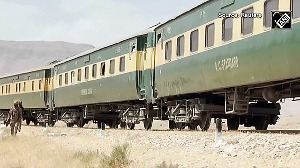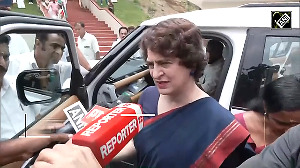The comptroller and auditor general has unearthed a Rs 450-crore scam involving the purchase of Israeli unmanned aerial vehicles by the Hyderabad-based National Technical Research Organisation, a technical arm of the external intelligence agency Research and Analysis Wing.
In the first-ever audit of any intelligence agency in India, it was found that these UAVs were lying as junk. The CAG said that this was a major concern of accountability.
Efforts were mounted to prevent the probe sought by the CAG on the basis of a complaint from a whistle-blower, but Prime Minister Dr Manmohan Singh allowed the inquiry overruling all objections. He felt such a serious charge on an agency providing technical intelligence capabilities to the country with a huge budget to fight cyber piracy is too serious to be overlooked, said insiders.
The CAG submitted its report to the government in the second week of February, marking it as "top secret" since its release in the public domain can blow off the secrecy of the NTRO's operations. The research body was set up in 2004, primarily for the strategic monitoring of satellite, terrestrial and Internet communications.
The government decided to keep the report under wraps and did not table it the Parliament, accepting the CAG's "top secret" label, but the Prime Minister's Office has now ordered an internal inquiry into the 2007 purchase.
The budget and expenditures incurred by intelligence agencies are treated as sacrosanct, as they are not allowed scrutiny by the CAG or even Parliament. But such a scandal has made Dr Singh think of making them accountable, sources in the said. The next meeting of the Cabinet Committee on Security may take a view on subjecting all intelligence agencies to CAG scrutiny.
The CCS had sanctioned Rs 300 crore in 2007 for the purchase of UAVs from Israel Aerospace Industries. NTRO, however, purchased additional satellite link and electronic intelligence equipment worth Rs 150 crore from the company without keeping the CCS in the loop.
The then NTRO chief tweaked the rules that empowered him to spend up to Rs 20 crore without clearance from the CCS by paying the additional Rs 150 crores in several smaller installments to show he was not overstepping his financial powers.
The then national security adviser M K Narayanan, who is now the West Bengal governor, had tried to scuttle the inquiry the CAG wanted to carry out in December 2009 on the complaint by a whistle-blower. Narayanan pointed out that intelligence agencies were not brought under the scanner to maintain secrecy. The NTRO reports directly to the NSA and the R&AW chief, and hence Narayanan's refusal of permission meant a dead end.
The CAG, however, felt the tip-off was too serious to be ignored and hence approached the prime minister who overruled Narayanan's objections and allowed the CAG sleuths to get cracking in January last year. NTRO chairman KVSS Prasada Rao, a scientist who retired last October, and its current adviser M S Vijayaraghavan, have been indicted in the CAG report. Rao had also served in the space department and the Defence Research and Development Organisation earlier.
As part of the inquiry ordered by the PMO, some major generals who were on deputation to the NTRO, as also some senior finance officials involved in the deal, are being questioned. Once this internal inquiry is over, the government may hand over the case to the Central Bureau of Investigation, sources said.
The CAG has noted that the UAVs are lying grounded as the satellite link purchased was not meant for dedicated transmission and the military personnel in the NTRO objected to launching them, as it would allow any person to download sensitive data.
The decision by the NTRO top brass not to include the satellite link and electronic intelligence equipment in the proposal put before the CCS is itself intriguing as without them the UAVs could be nothing more than electronic-controlled toy aircraft.
The CAG has faulted NTRO officials engaged in the dubious purchase for taking the Israeli vendor on his word that the "satellite link was successfully tested in Australia."







 © 2025
© 2025